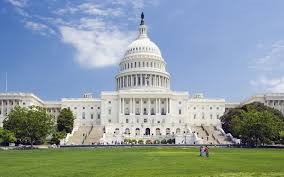
Republican candidates for a congressional seat in Northwest Georgia took turns Monday touting their similar conservative views and pouncing on supposed weak spots in each other’s backgrounds during a debate ahead of the June 9 primary.
In all, nine Republican candidates have signed up for the race to replace outgoing U.S. Rep. Tom Graves, a Republican, who announced late last year that he will not seek re-election. He has held the 14th District seat since first winning election in 2010.
The reliably Republican district stretches from Paulding and Haralson counties north through Rome, Calhoun and Dalton to the Tennessee line.
Of the nine Republican candidates, eight appeared in Monday’s debate hosted by the Atlanta Press Club. They alternated between praise for President Donald Trump and his administration’s policies, disdain for congressional Democrats and a handful of jabs at each other.
The race has also drawn one Democratic candidate, Kevin Van Ausdal, an implementation specialist. Van Ausdal did not participate in the primary debate because he is the only Democratic candidate.
The Debate
Without much daylight between them in terms of policies and values, some of the Republican candidates took to attacking each other’s records.
John Barge, a former Georgia state school superintendent, singled out Marjorie Taylor Greene’s decision to back out of the 6th District congressional race earlier this year and enter the 14th District contest. Barge labeled Greene an “opportunist”.
“I think you’re running to get to Washington,” Barge said.
Greene, a construction company owner, stressed that her staunchly conservative values align with many of the district’s voters and touted endorsements from influential members of Congress like U.S. Rep. Jim Jordan of Ohio.
“I’m 100% pro-life, 100% pro-gun, and I’m the strongest supporter of President Trump and always have been,” Greene said.
Greene then attacked Barge for implementing federal Common Core education standards while serving as state superintendent. He batted back the criticism, saying he was ordered to do so by the state Board of Education despite not supporting the program.
Barge also said he supports ending federal oversight of schools by abolishing the U.S. Department of Education and handing authority over education matters and funding to states.
“I think giving states the flexibility to direct those funds in the way they need them is the way to go,” Barge said.
John Cowan, a neurosurgeon who owns a toy shop, was criticized by some candidates for buying products made in China and not in Northwest Georgia. Cowan defended his business practices, saying he has experience negotiating with Chinese manufacturers.
“I’ve been tougher on China than anyone on this panel because I’ve actually engaged them,” Cowan said.
Matt Laughridge, a businessman, drew a line in the sand by saying that he thinks “personally, we should cut off China, not team up with them.”
“If you’re sick of seeing ‘Made in China’ on everything, elect me,” Laughridge said.
Bill Hembree, a former state House representative, was blunt about Cowan.
“You’re getting rich off China,” said Hembree, who also noted he supports term limits.
Cowan also said he favors moves to reopen local economies emerging from the coronavirus pandemic amid his background in the medical field and that there needs to be a balance between science and economic needs.
“We have to reopen our economy and preserve our freedoms and meld the two together,” Cowan said.
Greene also said she backs calls by Trump and Gov. Brian Kemp to reopen many local businesses, describing efforts to reopen local economies as “the greatest stimulus.”
“I believe more than anything that we need to save our economy and stop socialism,” Greene said.
For his part, Hembree touted his experience in the Georgia House of Representatives, noting that he decided to run for Congress to back Trump amid opposition from congressional Democrats.
“We need to save this country and we need to save the future,” Hembree said.
State Rep. Kevin Cooke, R-Carrollton, also highlighted his General Assembly experience as an asset setting him apart from his competitors, particularly as congressional and state lawmakers deal with the current economic fallout of COVID-19.
“It very much highlights the difference between my candidacy and my opponents’ candidacy,” said Cooke, noting he would support requiring the federal government to have a balanced budget.
Andy Gunther, a retired U.S. Marine and businessman, was among several candidates who advocated for a balanced budget. He said his business experience would go a long way toward righting financial troubles at the federal level.
“A lot of the solutions to the problems that we have in the federal government are business solutions,” Gunther said.
Ben Bullock, a real estate investor and U.S. Air Force veteran, urged conservatives to oppose moves by many Democratic leaders to provide universal health-care coverage especially amid coronavirus, framing such efforts as “authoritarian behavior on the left.”
“To me, it is a total privilege,” Bullock said.
Bullock also echoed other candidates in calling for U.S. troops to return from the war in Afghanistan.
“It’s a fight that is now [Afghanistan’s] and not ours anymore and that needs to be reflected in our national security policy,” Bullock said.
Clayton Fuller, a prosecutor and U.S. Air Force veteran, did not participate in Monday’s debate because he was deployed with the Air National Guard to assist with the coronavirus response.